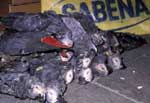
| Amazon Expedition Travel
|
 |
|
|
|

| User Functions
|
|
|
Don't have an account yet? Sign up as a New User
|
|

| Help support this site!
|
|
|
Help support this site... your donations are needed to support research, conservation, and rescue efforts.
|
|

|
 |
| New EU 'will boost illegal wildlife trade' |
 |
Tuesday, April 27 2004 @ 12:16 AM UTC
Contributed by: MikeSchindlinger
Views: 9344
|

 UNSCRUPULOUS traders will exploit the enlargement of the European Union to sell illegally obtained wildlife, experts will warn today. UNSCRUPULOUS traders will exploit the enlargement of the European Union to sell illegally obtained wildlife, experts will warn today.
Speaking as the EU prepares to welcome ten new members, Traffic and WWF, the global environment network, urged the accession countries to increase efforts to stem the illegal wildlife trade.
JAMES REYNOLDS
ENVIRONMENT CORRESPONDENT
A report by Traffic Europe reveals that current differences between wildlife trade controls in existing and new states have allowed traders legally to import species banned in the EU for years.
It voices concern that traders in accession countries will make use of the opportunity to introduce illegal species, together with their legal stock, when the borders disappear on 1 May. Such species include tortoises, parrots, snakes and lizards destined for the pet trade.
Between 2000 and 2002 more than 1,000 endangered Kleinmannís tortoises have been smuggled into Poland and Malta. It is likely that these will find a ready market in the EU after the borders have opened.
There is also evidence that threatened St Lucia Amazon parrots and Madagascar tortoises, which can raise several thousand euros on the black market, are being illegally kept in the Czech Republic.
The report also shows that in some of the new states, traders are stockpiling stocks in anticipation of border changes.
After accession, Europeís eastern border will increase in size by a third and will be controlled by seven instead of three countries, with a further reduction in customs staff at existing borders.
Control of illegal wildlife trade in the EU is particularly challenging as systematic controls only take place at external borders. Once regulated animal and plant species enter the EU, they can be moved freely between the countries.
Stephanie Theile, the author of the report, said: "Better co-ordination and co-operation between enforcement agencies is urgently needed to improve the EUís ability to tackle illegal wildlife trade.
"Member states must act now and ensure that enforcers work together to prevent illegal wildlife from entering the markets of the enlarged EU."
The report urges EU governments to establish a European taskforce to monitor illegal wildlife trade.
http://news.scotsman.com/scitech.cfm?id=473012004
|
|
|
|

|

|

